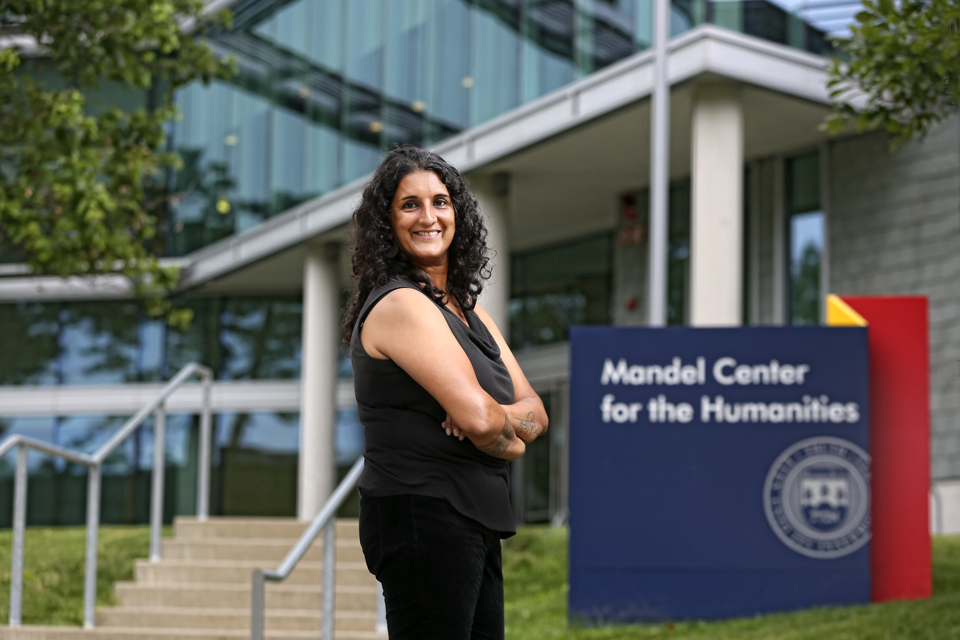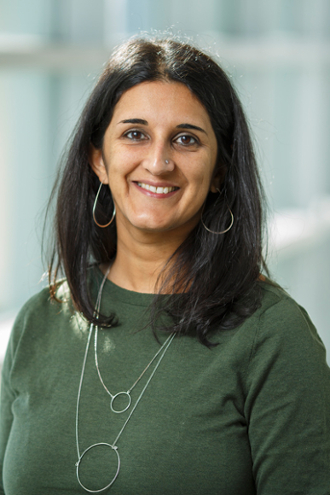Ulka Anjaria set to usher in new era for the humanities at Brandeis
Anjaria brings interdisciplinary approach to her new position as Mandel Center for the Humanities director
 Photo/Mike Lovett
Photo/Mike LovettMandel Center for the Humanities director Ulka Anjaria
Brandeis professor Ulka Anjaria has taken the baton from professor Ramie Targoff and begun serving as the second Jehuda Reinharz Director of the Jack, Joseph and Morton Mandel Center for the Humanities.
Anjaria, member of the English department, and the programs in South Asian Studies, and Film, Television and Interactive Media, is an expert in Indian literature and film, with a recent book on Bollywood. Inspired by her academic focus, Anjaria hopes to add a more global, interdisciplinary layer to the research, courses and events at Mandel, and sees the center as an intellectual hub for all students and faculty on campus.
BrandeisNOW spoke to Anjaria about her vision for the Mandel Center:
How are you approaching your new role as Mandel Center director?
It’s an exciting time to be leading an institution like this because the humanities are more important than ever. I am eager to work with faculty and students to uncover new ways we can incorporate the humanities across disciplines at Brandeis.
My predecessor, Ramie Targoff, who served as the inaugural Mandel director for 11 years, really made the center a hub for the humanities on our campus. I feel privileged to continue the work she started and see where our work in the humanities leads in the 21st century. And of course we’re all so grateful to the Mandel family for their support of the humanities at Brandeis and elsewhere.

Ulka Anjaria
How do you describe the study of the humanities at Brandeis?
Part of what the study of the humanities at Brandeis offers is an examination of texts in their cultural and historical context. That’s an important skill for all students to have. We also pay attention to how language works by closely studying the written word. This applies to a range of texts, not just the classics. The humanities have a global element as well.
I also believe humanistic approaches work across disciplines and we shouldn’t police where the humanities end and where the arts, science, and social sciences begin. We can use the humanities to ask and answer many different kinds of questions about the real world. The humanities have the potential to be an intellectual hub that brings together different sectors of the university and provides students with a unique lens, regardless of their field of study.
Why is this interdisciplinary approach so valuable to students at Brandeis?
Publicly there are many conversations about what the humanities can do — particularly as we try to answer some of society’s biggest questions and challenges. The sensitivity to and understanding of cultural context that the humanities provides is very valuable.
I think Brandeis students see this and contribute a lot to the humanities, not only by taking classes and interacting with our faculty, but also by applying their outside perspectives. Many Brandeis students who major in the sciences or social sciences take humanities courses and add a lot to them, just as humanities students add their unique perspectives to science and social science courses. These exchanges are one of the great things about teaching at Brandeis.
How do you see yourself engaging with the humanities curriculum?
One of my goals is to continue crossing boundaries across departments and fostering innovative thinking from faculty and students. I also want to begin conversations about how the humanities at Brandeis can address some of our greatest challenges as a society, from climate change and the COVID-19 pandemic to equity and equality.
I want to create opportunities for our faculty and students to also pitch ideas for courses that don’t currently exist that might help us seek answers to some of these big questions. The main thing is I want the Mandel Center to be a place where people can have these critical conversations beyond the limitations of traditional departments.
What programming will the Mandel Center offer for the upcoming academic year?
We have several exciting events planned for the fall and spring semesters, including several faculty talks and a visit to campus by Columbia University professor and eminent writer Colm Tóibín, who will speak to us in April about James Baldwin. His visit to Brandeis is part of the Mandel Lectures in the Humanities series.
Our opening reception will take place in September. We have a new website launching this summer, and there will be more events added to our calendar once it’s live.
Categories: General, Humanities and Social Sciences, Student Life





